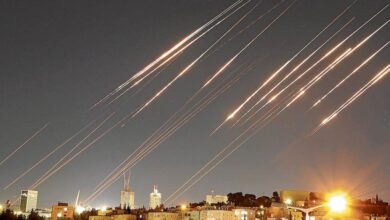This Is How Latin America Reacts To The Conflict Between Israel And Palestine
This issue has divided the region before. However, since Saturday there has been general condemnation in Latin America of the attack against Israel. The American countries call for dialogue .

Photo: EFE/EPA/ABIR SULTAN
EFE
Listen to this article
Leer en español: Así reacciona América Latina al conflicto entre Israel y Palestina
The attack against Israel carried out early this Saturday by the Hamas group and other extremist Palestinian militias has generated general condemnation in America led by the US, Tel Aviv's main ally, as well as a call to the dialogue to avoid a dangerous escalation of violence in the Middle East.
The surprise attack carried out by the radical Islamist group Hamas from the Gaza Strip against Israel and the military response ordered by the Government of Benjamin Netanyahu, which declared a “state of war”, have left a provisional toll of more than 500 dead (more than 300 in Israel and at least 232 in Palestinian territory).
The most forceful reaction was that expressed by President Joe Biden, who immediately after the attack called Netanyahu to condemn the terrorist attacks on Israel, offer support measures and issue a warning to that country's enemies. In addition, the American president emphasized that his country “will never stop supporting Israel.”
For his part, Brazilian President Luiz Inácio Lula da Silva expressed his "rejection" of the "terrorist attacks" in Israel and called on the international community to work towards peace negotiations between the parties.
Brazil convenes the UN Security Council
Brazil, which holds the Presidency of the UN Security Council, announced this Saturday that it will call an "emergency meeting" of the body in the face of the serious escalation of violence in Israel and the Palestinian Territories.
The meeting of the UN's highest decision-making body will take place on Sunday in a closed-door session in which its fifteen members will address "the situation in the Middle East, including the Palestinian issue."
The Secretary General of the United Nations, António Guterres, expressed his concern for the civilian population in the escalation of the Palestinian-Israeli conflict and called for "all diplomatic efforts to avoid a major conflagration."
Read also: UN Multinational Force In Haiti: What Is It And How Does It Work?
Meanwhile, the World Jewish Congress (WJC) condemned what it described as an "atrocious terrorist assault against the State of Israel" and expressed support for the country on the part of "the entire Jewish diaspora," which this international organization represents in more than 100 countries.
New York City, which is home to the largest Jewish community in the world outside of Israel, has increased security near synagogues and areas with Jewish populations although authorities have stressed that "there is no credible threat" in the large city.
The reinforcement of security measures has also become evident in Argentina, where the Government of Alberto Fernández ordered a "general alert" for the institutions of the Jewish community and the borders of the South American country after the multiple attack perpetrated by Hamas against Israel.
Between 300,000 and 400,000 Jews reside in Argentina, which is the largest community in Latin America and the fifth largest in the world, according to figures provided to EFE by the Latin American Jewish Congress.
The South American country keeps in its memory the two serious attacks suffered in the 1990s against Jewish interests : the attack on the Israeli Embassy in 1992, which left 29 dead, and the one perpetrated against the Argentine Israelite Mutual Association (AMIA), which In 1994 it killed 85 people and injured more than 300.
General condemnation of Hamas attack
Over the last few years, Latin America has been divided when it comes to showing its support or rejection of the parties to the Israeli-Palestinian conflict. Traditionally, this has depended on the political color of the Government in power.
However, on this occasion, the magnitude and seriousness of the events has provoked a widespread response of condemnation, except for a couple of isolated cases.
Thus, while Lula da Silva emphasized that "Brazil will spare no effort to prevent the escalation of the conflict, even in the exercise of the Presidency of the UN Security Council," Argentina said that it "condemns" and "deplores" the multiple attack. of Hamas against Israel.
From Bogotá, the Government of Gustavo Petro "vehemently condemned terrorism and attacks against civilians" in Israel. The Colombian president also called for "a peace dialogue where the Palestinian State is comprehensively recognized."
The Government of Chile – where the largest community of Palestinian origin resides outside the Middle East – also expressed its "absolute condemnation" of the attacks this Saturday against a series of towns and cities in Israel and expressed its condolences to the families of the victims and its solidarity with the people of Israel.”
In line with what was expressed by other Foreign Ministries in the region, the Chilean Ministry of Foreign Affairs made "a call for an end to this inappropriate violence, in order to avoid an escalation that causes greater damage and suffering to the civilian population."
Last December, a speech given by President Gabriel Boric to a Palestinian audience in which he spoke of “a community that is suffering from an illegal occupation, that is resisting and that is seeing its rights and dignity violated every day” generated rejection of Chilean-Israeli sectors.
The Government of Mexico also condemned "the attacks suffered by the people of Israel" by the Islamist group Hamas from Gaza and demanded "an end to the unnecessary violence."
And from Asunción, President Santiago Peña referred to the "cowardly terrorist attacks" against Israel. "All our support to the sister nation of Israel in the face of the cowardly terrorist attacks it has suffered," said the Paraguayan president.
The reaction of the Panamanian Executive was equally firm. “We express our solidarity with the Israeli people in these difficult times. Panama firmly condemns the recent attacks against the people of Israel,” said President Laurentino Cortizo.
On the contrary, the Government of Venezuela advocated for a "genuine negotiation" between Israel and Palestine to end the violence in the Gaza Strip and said that this "escalation is the result of the inability of the Palestinian people to find legal multilateral international community a space to assert its historic rights," in an official statement in which it did not condemn the Hamas attacks.
Venezuela is a strong ally of Palestine, especially since 2009, when it became the first country in America to recognize it as a State.
Along the same lines, the Nicaraguan Executive, chaired by the Sandinista Daniel Ortega, declared itself "always in solidarity with the Palestinian cause" and condemned the "worsening" of the "terrible" Palestinian-Israeli conflict.
In a statement, entitled "Enough of victims and pain", without mentioning the actions of Hamas, he assured that he "strongly condemns, as always, this tragic, dramatic situation that continually worsens, in the face of arrogance, blindness, incomprehension and inaction of the international community and particularly of the United Nations".
Likewise, the Cuban Government expressed its "serious concern" about the new escalation of violence between Israel and Palestine and the Island's Foreign Ministry pointed out that the conflict is "a consequence of 75 years of permanent violation of the inalienable rights of the Palestinian people and of the Israel's aggressive and expansionist policy.
Bolivia's Solomonic reaction
More Solomonic was the reaction of Bolivia, whose Government expressed its "deep concern" about the "violent events" that occurred in the Gaza Strip between Israel and Palestine, and criticized the "inaction" of the United Nations and the Security Council regarding these events, in contrast to the Government of Peru, which "strongly condemned the terrorist attacks perpetrated by the Hamas group against the State of Israel" and expressed solidarity with "the Israeli people, the victims and their families."
And while the president of Guatemala, Alejandro Giammattei, expressed his "condolences" and "support" to Israel in the face of the "unjustified" attacks against it, orchestrated by the Islamist movement Hamas, his Dominican counterpart, Luis Abinader, did the same and warned that “this escalation of violence prevents the peace solutions that we all desire.”
Likewise, the Foreign Ministries of Uruguay and Costa Rica issued separate statements of condemnation. Uruguay "deplores with the greatest firmness the terrorist actions underway against Israel and its population" and "expresses its solidarity with the State of Israel and the victims of these attacks," they said from Montevideo, while in San José, they also demanded “ the immediate release of hostages".




